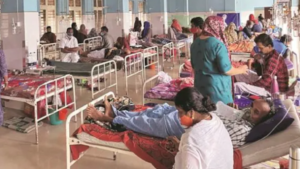Physical Address
23,24,25 & 26, 2nd Floor, Software Technology Park India, Opp: Garware Stadium,MIDC, Chikalthana, Aurangabad, Maharashtra – 431001 India
Physical Address
23,24,25 & 26, 2nd Floor, Software Technology Park India, Opp: Garware Stadium,MIDC, Chikalthana, Aurangabad, Maharashtra – 431001 India

Climate change is amplifying various health-related risks in India leading to an alarming rise in the loss of lives and livelihoods. This has come to light as one of the world’s leading health journals, The Lancet, recently published its 2022 edition of the Lancet Countdown on health and climate change. The report looked at 103 countries this year and highlighted the growing threat of fossil fuels to human health. The report revealed that governments and companies continue to follow strategies that increasingly threaten the health and survival of all people alive today, and of future generations.
“The world is at a critical juncture in its response to climate change. Worldwide, people are seeing their health increasingly affected by climate change amidst the compounding impacts of COVID-19 and the cost of living and energy crises; governments and companies continue to prioritize fossil fuels over a healthy future despite climate commitments; and rapid, holistic action is the only route to ensuring a just and healthy future,” the report said.
The Lancet report analyses 42 indicators across five domains – climate change, adaptation, planning and resilience for health, mitigation actions and health co-benefits, economics and finance as well as public and political engagement.
The India-specific factsheet, derived from the Lancet report which is not a part of the document itself, has important findings.
Increase in heat-related deaths
From 2000-2004 to 2017-2021, within a span of around 20 years, heat-related deaths increased by 55% in India, the Lancet report mentioned. India witnessed an unprecedented heat wave this year between March and April. The report further said that this heat wave was 30 times more likely to have happened because of climate change.
“Exposure to extreme heat affects health directly, exacerbating underlying conditions such as cardiovascular and respiratory disease, and causing heat stroke, adverse pregnancy outcomes, worsened sleep patterns, poor mental health, and increased injury-related death,” the report noted.
According to the report, globally the number of heat-related deaths surged by 68% between 2000-2004 and 2017-2021, and vulnerable populations, such as the elderly and young children, experienced 3.7 billion more heatwave days in 2021 than they did annually in 1986-2005.
Effect of burning of fossil fuels on health
The report found that approximately more than 3,30,000 persons died in India in 2020 because of exposure to particulate matter from fossil fuel combustion. The study also found that biomass accounted for 61% of household energy consumption in 2019 in India, while fossil fuels accounted for 20%.
“Fossil fuel dependence is not only undermining global health through increased climate change impacts, but also affects human health and wellbeing directly, through volatile and unpredictable fossil fuel markets, frail supply chains, and geopolitical conflicts,” the report said.
Because of the high reliance on dirty fuels, average household concentrations of particulate matter exceeded the WHO recommendation by 27-fold nationally and 35-fold in rural homes in India, the report found.
Impact on food security and labour
The report also highlighted the economic impact of climate change in India and it found that exposure to rising temperature conditions has taken a toll on the GDP of the country. Exposure to heat caused a loss of 167.2 billion potential labour hours among Indians in 2021, the report noted. This resulted in income losses equivalent to about 5.4% of the national gross domestic product, it said.
Cropping season and yield have a direct impact on the food security of the country. High temperatures during growing seasons lead to fast crop maturation, which reduces the maximum potential yield that could be achieved with no limitations of water or nutrients.
The duration of the growing season for maize has decreased by 2%, compared to a 1981-2010 baseline, while rice and winter wheat have each decreased by 1%, the report found.
Spread of diseases
The report found that between the periods 1951-1960 and 2012-2021, the number of months suitable for dengue transmission by the Aedes aegypti mosquito increased by 1.69% and reached 5.6 months every year in India.
According to the report, on average, from 2012-2021, each infant experienced an additional 0.9 heatwave days per year while adults over 65 experienced an additional 3.7 per person, compared to 1986-2021.
The report said that the changing climate is affecting the spread of infectious diseases, putting populations at higher risk of emerging diseases and co-epidemics and coastal waters are becoming more suitable for the transmission of Vibrio pathogens.
(with inputs from Aayushi Sharma)